Key takeaways:
- Identifying unique project elements and practicing succinct delivery are essential in pitch preparation.
- Understanding an agent’s perspective and aligning your pitch with their interests can foster strong connections.
- Crafting a compelling query letter involves personalization, a strong hook, and showcasing your voice.
- Responding to feedback with gratitude and openness can enhance professional relationships and improve your work.
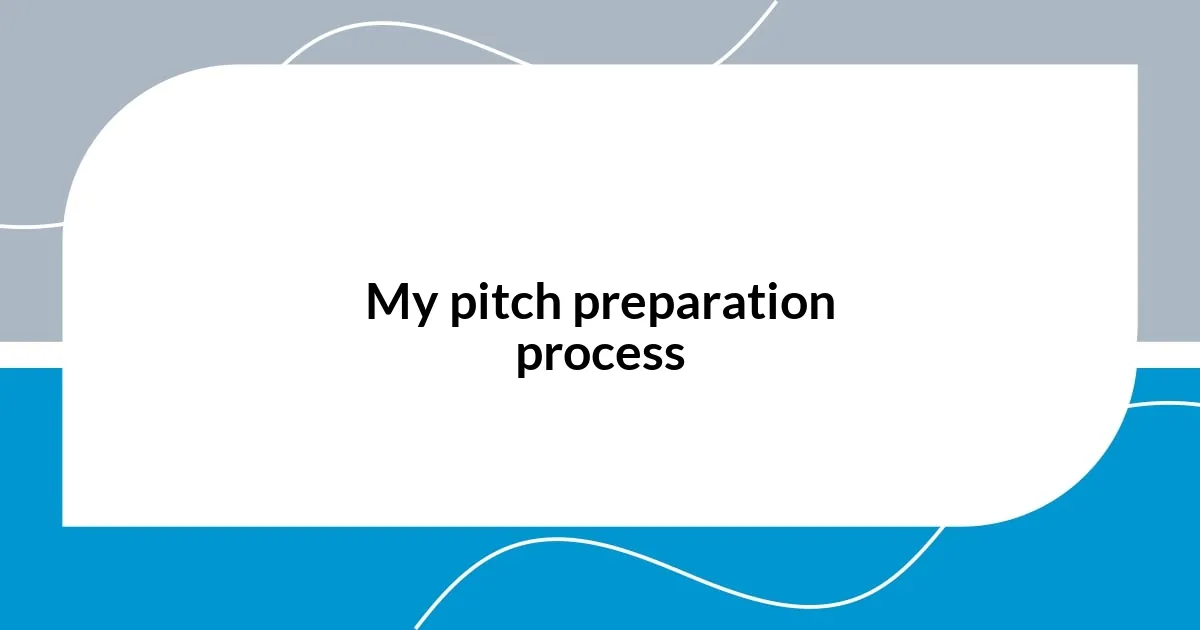
My pitch preparation process
Preparing my pitch is a journey that begins long before I step into the room with an agent. I often start by identifying the unique elements of my project—what makes it stand out? For example, I remember when I was crafting my pitch for my first novel; I spent hours dissecting the themes and characters, ensuring that I could convey their complexity in just a few sentences.
Next, I practice relentlessly. I role-play with friends and even in front of a mirror to gauge my delivery. One time, I got so wrapped up in refining the pitch for a non-fiction book that I inadvertently overshot the time limit during a mock session. That moment made me realize the importance of being succinct while still capturing the heart of my message. Have you ever experienced that urge to spill every detail, only to find that less is often more?
Lastly, I dive deep into research about the agents I’m targeting. Understanding their preferences and previous works helps me tailor my pitch. For instance, when I pitched to an agent known for their passion for character-driven stories, I emphasized the emotional arcs of my characters, which resonated with their style. It’s exhilarating to think that by aligning my vision with their interests, I could forge a valuable connection. Have you ever felt that thrill when you know you’ve hit the right chord with someone? That feeling motivates every aspect of my preparation.

Understanding the agent’s perspective
Understanding an agent’s perspective is crucial when you’re pitching your work. From my experience, agents are not only looking for a polished manuscript; they want to see the potential for a strong professional relationship. I vividly recall the moment an agent expressed that they were more interested in the passion behind my story than just the story itself. That taught me the importance of showcasing my genuine enthusiasm and why I felt compelled to write my book.
Moreover, agents often deal with countless proposals daily, so standing out is vital. I’ve learned that clarity and authenticity are key. At one pitch session, I noticed how an agent’s eyes lit up when I shared a personal experience that inspired my narrative. It felt rewarding to connect on a deeper level, as if I wasn’t just sharing a manuscript, but a piece of myself. Have you ever felt that rush when you realize your story resonates with someone else?
Lastly, I find that knowing an agent’s recent acquisitions can provide insight into what they’re currently excited about. When I pitched my contemporary romance, I referenced a recent book they represented that had a similar theme, which helped bridge our connection. It’s fascinating how aligning your project with an agent’s existing interests can create a pathway to collaboration.
| Agent’s Focus | What They Value |
|---|---|
| Market Trends | Novelty and Uniqueness |
| Passion for Story | Author’s Voice and Style |
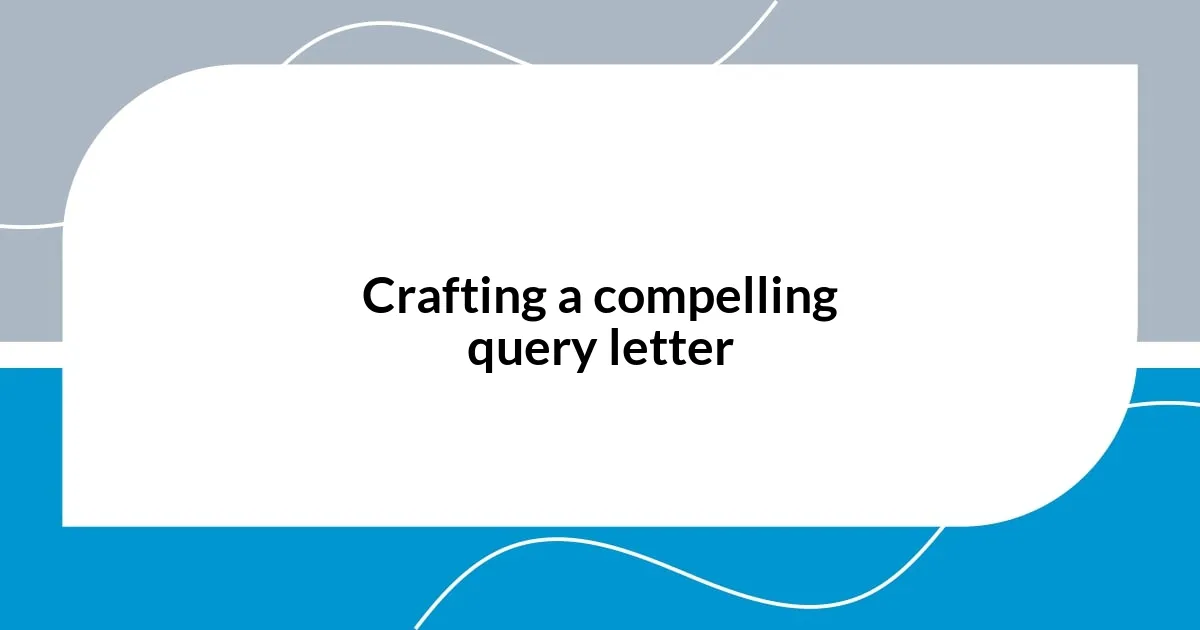
Crafting a compelling query letter
Crafting a compelling query letter is like setting the stage for a performance where every word counts. When I was preparing my first query, I vividly remember sitting down with a cup of coffee, trying to distill my entire novel into just one page. It felt daunting, but I knew clarity was key. I focused on my story’s core conflict, hooks, and character motivations—elements that would make an agent eager to read more. This sense of urgency pushed me to refine every sentence until I felt it truly represented my voice.
Here’s what I found beneficial when constructing my query letter:
- Personalization: Address the agent by name and mention why you’re attracted to them specifically.
- Strong Opening Hook: Begin with a striking line that encapsulates your story’s essence.
- Compelling Synopsis: Include a brief yet captivating summary of your work that highlights the stakes.
- Author Bio: Share relevant background information that connects you to the story.
- Professional Tone: Maintain a balance between professional and approachable language.
When I tweaked my query using these tips, I felt a newfound confidence. It was as if my letter no longer felt like a mere request but a conversation between future colleagues. Have you ever felt that shift in perspective when you know you’re sharing something genuine? That’s the magic I aimed for with my letters.
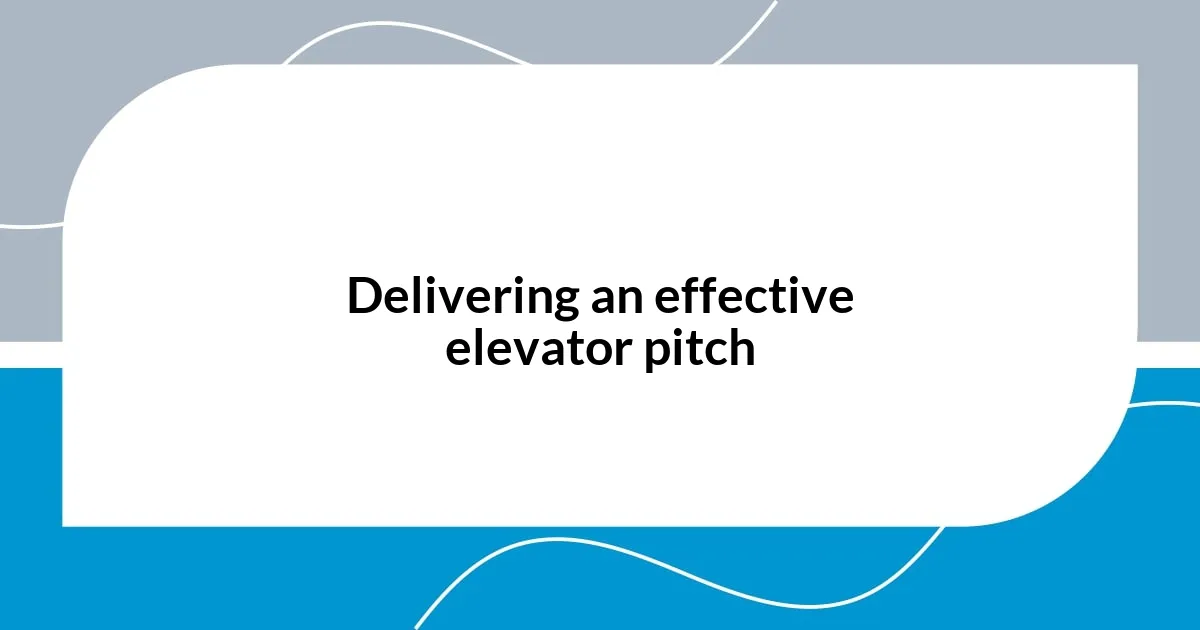
Delivering an effective elevator pitch
Delivering an effective elevator pitch is all about captivating your audience quickly. I remember standing in a crowded room, nervous yet excited, sharing the essence of my story within just a couple of minutes. The agent I spoke to leaned in closer, and I could see her interest piqued—proof that a concise and engaging pitch can spark genuine curiosity. It made me realize how critical it is to distill your ideas into a compelling narrative that resonates immediately.
One effective technique I adopted was to weave in a relatable scenario that echoed the themes of my book. For instance, when I pitched a story about overcoming personal loss, I shared a brief, heartfelt moment from my life where I faced a similar challenge. This emotional connection made my pitch memorable, and it left a lingering impression. Have you ever noticed how sharing a slice of your own experience can transform a simple pitch into a genuine conversation?
Moreover, practice truly makes a difference in your delivery. After several attempts, I found that rehearsing in front of friends not only eased my nerves but also helped me refine my tone and pacing. I learned to pause at key moments to let the emotional weight of my words sink in. By the time I stood in front of an agent, I felt more like a storyteller than just another writer seeking representation. When was the last time you felt prepared enough to share your passion confidently? This clarity not only boosts your self-assurance but also attracts an agent’s attention, opening doors to future collaborations.
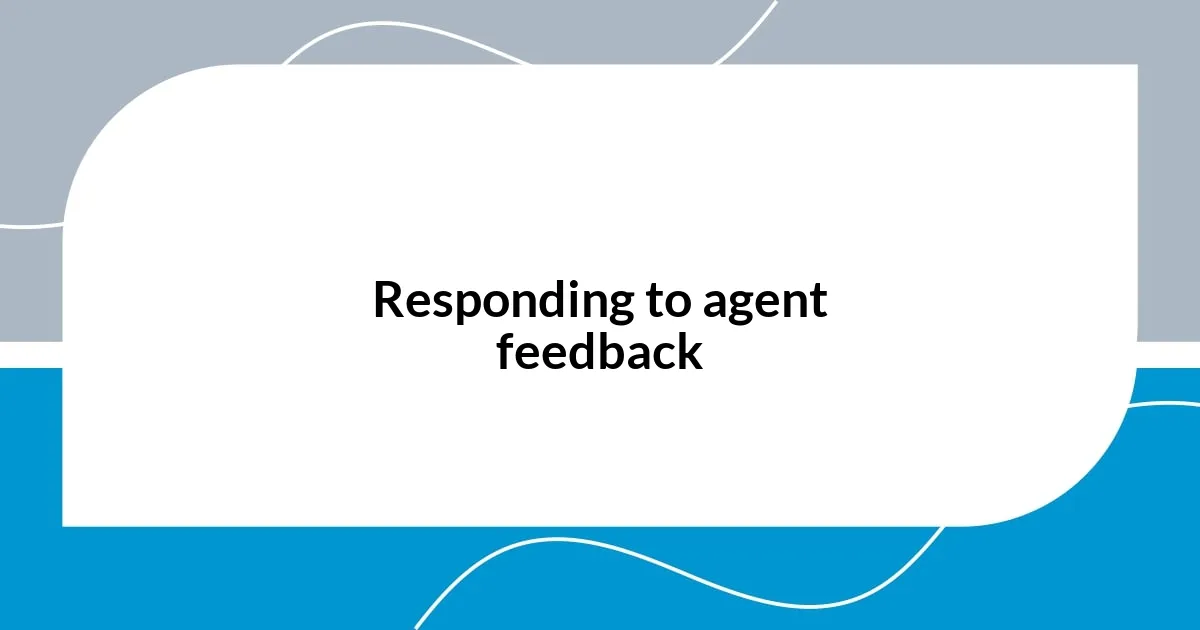
Responding to agent feedback
When I received feedback from agents, I initially felt a mixture of anxiety and hope. It’s like receiving a report card on your deepest creative efforts. I remember one agent suggesting that my main character lacked depth. At first, I was defensive—after all, I knew my character intimately. But as I reflected, I realized that her feedback was a golden opportunity. It motivated me to delve deeper, exploring my character’s backstory and motivations, ultimately enriching my narrative. Have you ever found that initial sting of critique can lead to your most significant breakthroughs?
It’s also crucial to approach feedback with an open mind. I quickly learned that not all suggestions needed to be taken verbatim; instead, I focused on the underlying themes in the feedback. For example, one agent pointed out pacing issues in the first act. While I loved the pace I had set, I took a step back and analyzed the flow. That reflection led me to adjust sections that aimed for suspense but fell flat. This balance of conviction and flexibility can feel tricky, but it’s where growth happens. How do you balance your vision with the insights of others?
Finally, I found it essential to express gratitude in my responses to agents. Even if the feedback wasn’t what I wanted to hear, acknowledging their time and effort fosters a professional relationship. I made it a habit to respond with appreciation, sharing how their thoughts would influence my revisions moving forward. This not only reflects your professionalism but also keeps the door open for ongoing dialogue. In the end, how we respond to feedback can shape not just our manuscripts, but also our futures in the literary world.
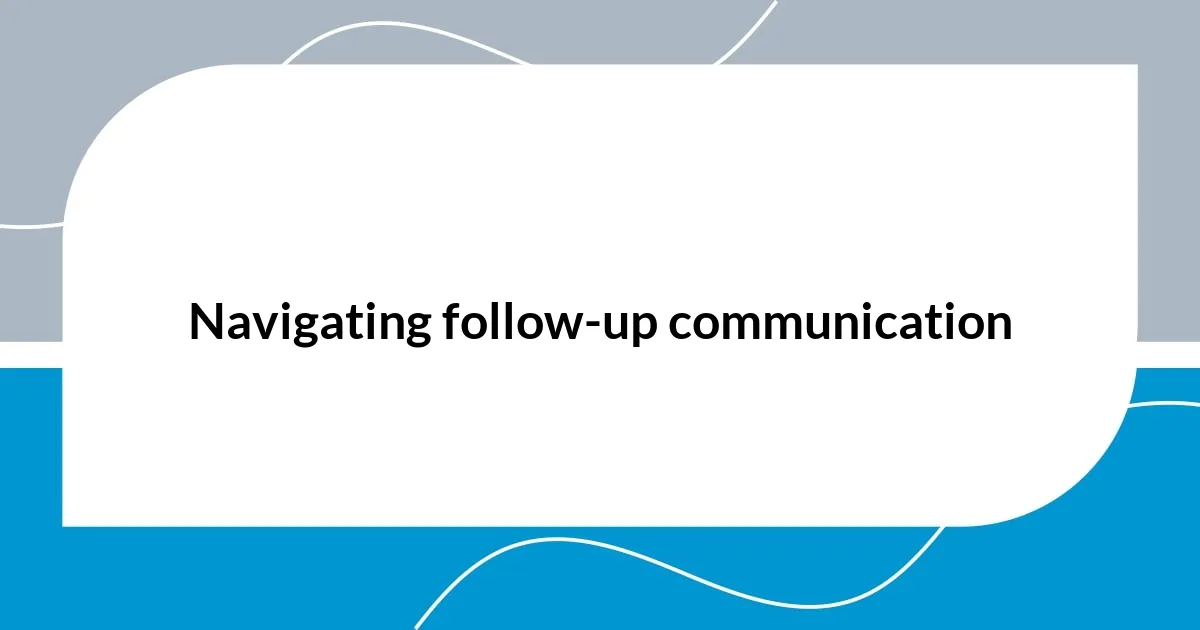
Navigating follow-up communication
Navigating follow-up communication after pitching to agents can feel like walking a tightrope. I remember nervously sending my first follow-up email, questioning whether I was being too pushy. To my surprise, I received an encouraging reply. It was a reminder that agents often appreciate a thoughtful follow-up. Have you ever hesitated to reach out, wondering if it might backfire? From my experience, a well-timed and polite follow-up can keep your project on their radar.
Timing is vital, though. I learned the hard way that following up too soon can come across as impatient. After one pitch, I waited a full month before sending a gentle nudge. In that email, I thanked the agent for their time and expressed my continued enthusiasm about my project. Reflecting on that experience, I realize that patience really does pay off. What’s the balance between eagerness and tact in your communication style?
Maintaining professionalism is equally important in your follow-up. In my last correspondence with an agent, I acknowledged their busy schedule while sharing a small update about my manuscript’s progress. It helped foster a sense of connection and shows that I value their support. I genuinely believe that these little touches can make a significant difference. Have you found ways to humanize your interactions? Each follow-up is an opportunity to strengthen your relationship with agents, helping them see you as not just a writer but as a collaborator.
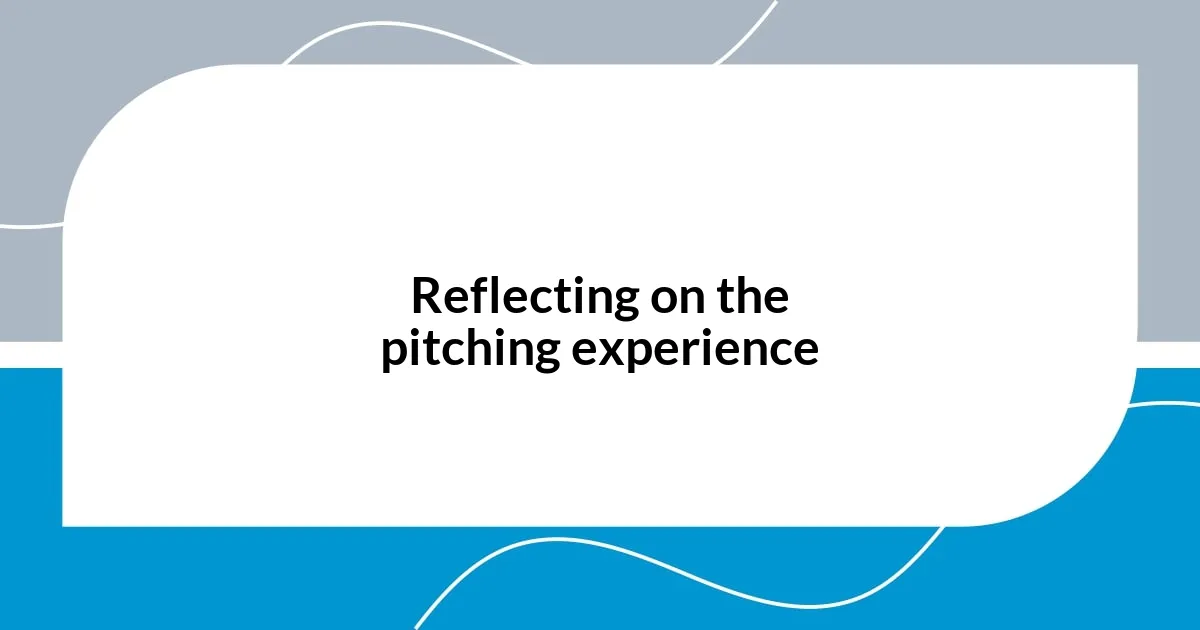
Reflecting on the pitching experience
Reflecting on my pitching experience, I found it transformative in ways I hadn’t anticipated. I vividly recall standing beside my laptop, my heart racing as I hit ‘send’ on my first pitch. It felt liberating, like I was finally sharing a piece of myself with the world. Does anyone else remember that mix of exhilaration and trepidation? That moment taught me that vulnerability can be more powerful than I ever imagined.
As I waited for replies, I discovered that anticipation can be a double-edged sword. Every ding of my email brought a rush of hope, but it also stirred up anxiety. I learned to channel that energy into writing more. It became my therapy, allowing me to process not just the fear of rejection, but also the excitement of potential success. Have you ever used creativity as a coping mechanism? I found it to be a fruitful distraction that often led to new ideas for future projects.
With time, I recognized that each pitch was a stepping stone in my growth as a writer. The moments I could have easily brushed off as setbacks ended up teaching me lessons that shaped my craft. One agent’s refusal, which initially felt devastating, pushed me to refine my voice and story structure. It’s intriguing how even the negative experiences can illuminate paths for improvement. Have you ever turned a disappointment into a driving force? I certainly have, and it was in that reflection that I learned the true value of resilience.